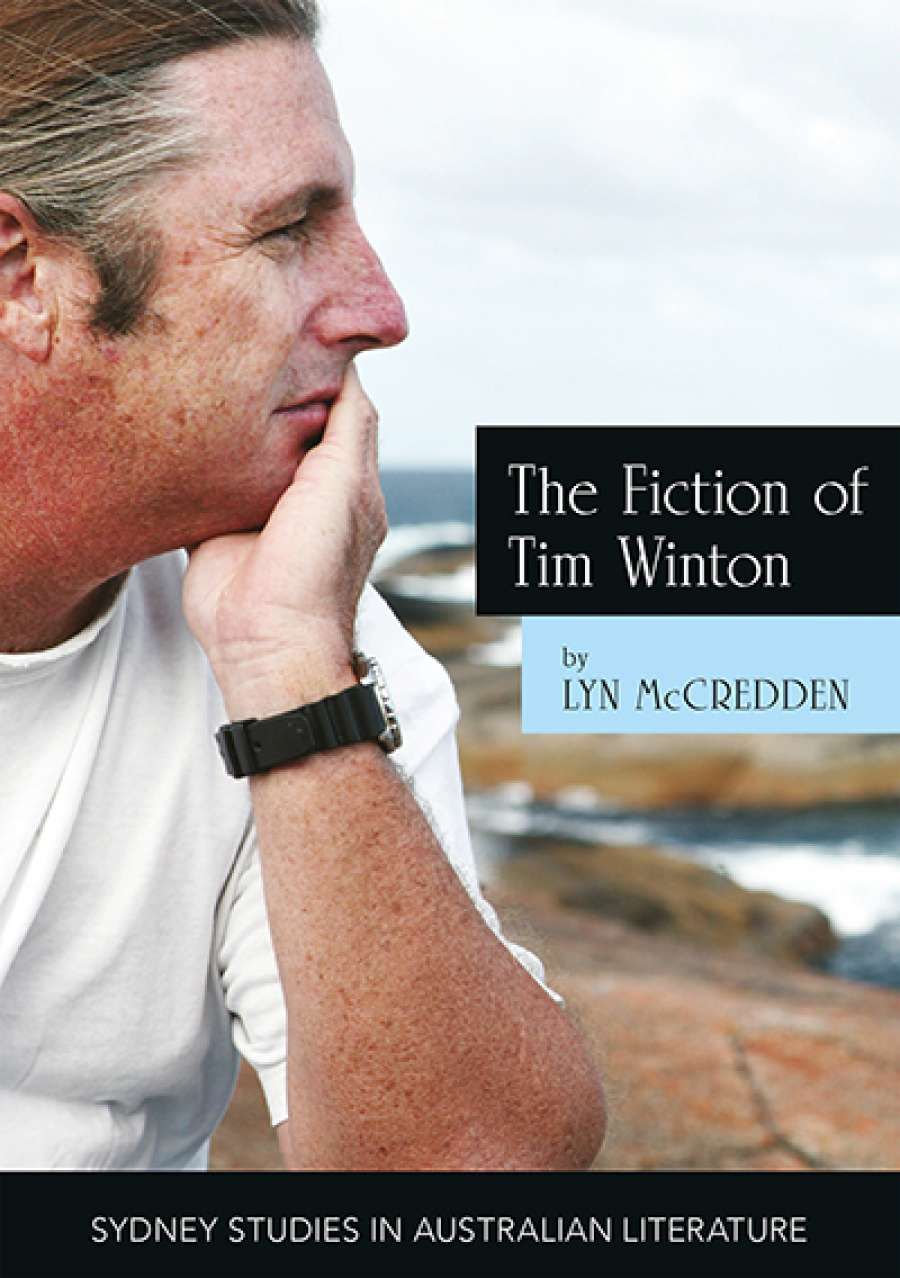
- Free Article: No
- Contents Category: Literary Studies
- Custom Article Title: Tony Hughes-d’Aeth reviews 'The Fiction of Tim Winton: Earthed and sacred' by Lyn McCredden
- Review Article: Yes
- Book 1 Title: The Fiction of Tim Winton
- Book 1 Subtitle: Earthed and sacred
- Book 1 Biblio: Sydney University Press, $30 pb, 165 pp, 9781743325032
In terms of book-length studies of Winton, McCredden’s monograph sits alongside Salhia Ben-Messahel’s Mind the Country: Tim Winton’s fiction (2006) and Tim Winton: Critical essays (2014), co-edited by McCredden and Nathanael O’Reilly, both published by UWA Publishing. Ben-Messahel’s book was a little underwhelming, an earnest thematic study that tended to give an account of Winton’s fiction that scarcely ruffled the picture one gets simply from reading the novels themselves. The 2014 edited collection had a bit more to chew on, with fine essays in particular those by Fiona Morrison, Tanya Dalziell, and Nicholas Birns.
So what does McCredden do with Winton in her study? The first clue is in the subtitle, Earthed and Sacred. McCredden draws on her long critical interest in ‘the sacred’ to situate Winton’s writing. This tends to be a polarising element in Winton’s fiction. Some are moved by the epiphanic or transcendental moments that descend like clockwork at the end of his novels to rescue the lost and broken from a world of empty cynicism and the clutches of their foundational traumas. Others find these moments mawkish blights that can never quite be forgiven. For McCredden, Winton is primarily a religious writer. She writes of the ‘theology of Winton’s fiction’, and sensing a raised eyebrow or two in the crowd, pushes ahead insistently: ‘for this is what [Winton’s fiction] is, a moral and ethical theology’. This is a slightly unusual usage of theology, but I take it to mean that Winton’s fiction offers either an exploration of human conduct in the face of divine imperatives, or, slightly more scandalously, an ethical assessment of the nature of divinity.
Both of these theses do seem operative in Winton’s work, and McCredden deserves credit for forcing them into the centre of its critical evaluation. Winton himself has never made any secret of his Christian faith and has tended to play a fairly straight bat to questions that are addressed to this aspect of his life.
McCredden, for her part, finds that Winton’s faith fundamentally offends certain secular norms in Australian society and that he is often cast in the position of defending the fact that he believes in God. She is probably not too far off the mark when she remarks that the ‘terminology of the sacred, and participation in it, are off-putting to many Australians’. With an air of defiance she declares that ‘this book will argue that to ignore the potency of the sacred as a category in Winton’s fiction ... would be seriously to under-read his work’.
I take McCredden’s point, and perhaps this is another element of the embarrassment that Winton provokes in some quarters. But it begs the question: if Australians are so put off by explicit moments of divine experience, why is Winton so popular in Australia? Perhaps the issue is less about Australians and their supposed faith-aversion, and more to do with a certain cul-de-sac that occurs when a critic tasked with considering culture rationally comes face to face with divine revelation in a text.
 Tim Winton (photograph by Denise Winton)
Tim Winton (photograph by Denise Winton)
The difficulty that McCredden faces in this study is how not to fall into the trap that Ben-Messahel fell into in her book on Winton, which is to give back the concerns of the novels in exactly the terms in which they were offered. If we accept that Winton’s concern with the sacred is loud and proud, why do we need a critic to draw our attention to it? McCredden’s way out of this dilemma is to introduce a meta-language, a critical apparatus assembled in (post)modern theology which contains bits and pieces of Heidegger, Kristeva, Derrida, and Judith Butler, with nods to David Tacey, Kevin Hart, Charles Taylor, and Michael Taussig.
By and large, this method does add something new and distinct not only to the study of Tim Winton, but also to that of Australian literature. McCredden’s engagement with Winton reminded me a little of my old teacher and colleague Veronica Brady’s tarrying with the novels of Patrick White in the 1970s. McCredden shares something of Brady’s inveterate eclecticism as well as her disinclination to being deterred by something as petty as taste. And like Brady, McCredden seems to hold that the literature of her author isn’t just accidentally sacred, as if it had not quite been paying attention and stepped in a puddle. The intrusion of the divine into Winton’s work is not something we should cravenly mumble through before we get on with the serious work of understanding his (clearly questionable) politics. For McCredden, the sacred in Winton’s fiction is something that deserves to be attended to and grappled with, and her book offers an example of how to do this.


Comments powered by CComment